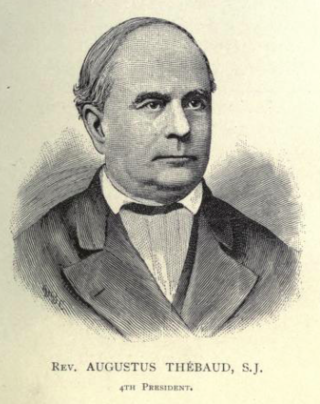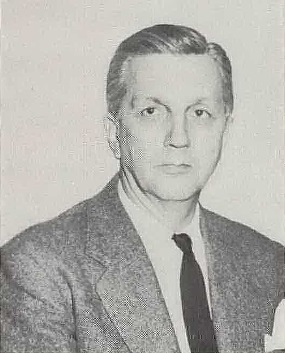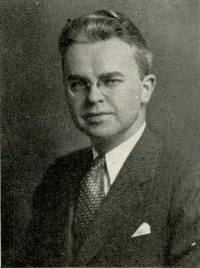Gaetano Leonard "Tom" Vincitorio (September 11, 1921 - November 26, 2007) was an American historian, author, and educator who specialized in Modern European History, particularly the British politician Edmund Burke.
Gaetano Leonard "Tom" Vincitorio (September 11, 1921 - November 26, 2007) was an American historian, author, and educator who specialized in Modern European History, particularly the British politician Edmund Burke.
Born on September 11, 1921, in Brooklyn, New York, Vincitorio attended St. John's University, where he graduated summa cum laude (B.S., 1942), and was also inducted into the Skull and Circle Honor Society. [1] He then attended Fordham University in Bronx, New York, where he received an M.A. (1943), and Ph.D. (1950) in History. He also took classes at Columbia University in 1946. Vincitorio's doctoral dissertation ("Edmund Burke's International Politics") was prepared under Professor Ross J. S. Hoffman.
After receiving his master's degree, Vincitorio taught history in New York City high schools before being hired to teach history and social sciences at Pace College from 1946 to 1948. He then joined the History faculty at St. John's University in 1948, where he was initially hired to replace the extremely popular Professor George "Doc" Murray, who had unexpectedly died in late 1947. [2] Vicitorio taught at St. John's for forty years and achieved the rank of Full Professor in 1957. He became chair of the history department in 1977. [3]
After publishing two articles on Edmund Burke in 1953 and 1957, Vincitorio then collaborated with his mentor, Ross J. S. Hoffman, and Morrison V. Swift on a textbook, Man and His History: World History and Western Civilization (Doubleday, 1958; revised ed., 1963). He also wrote companion testing volumes for that textbook as well as three others, all of which were published by Doubleday during 1958-1959. After editing a volume of essays by St. John's history faculty, Studies in Modern History (St. John's University Press, 1968), Vincitorio was the editor-in-chief of a Festschrift for Hoffman: Crisis in the "Great Republic": Essays Presented to Ross J. S. Hoffman (Fordham University Press, 1969), to which he contributed a chapter on "Edmund Burke and the First Partition of Poland: Britain and the Crisis of 1772 in the 'Great Republic.'"
Vincitorio then worked to continue James Truslow Adams' The March of Democracy: A History of the United States, which had originally been published in 1932-1933. The publisher, Charles Scribner's Sons, had begun to issue supplements chronicling events in American history since the original set was published, and Vincitorio co-edited Volume 8 (Challenge and Conflict), and then edited Volumes 9 (The Record of 1970-71), 10 (The Record of 1972-73), and 11 (The Record of 1974). He also contributed articles to the Catholic Encyclopedia for School and Home (McGraw-Hill, 1965), The New Catholic Encyclopedia (McGraw-Hill, 1967), and The Italian American Experience: An Encyclopedia (Garland Publishing, 2000), as well as to the journals Long Island Forum, New York Irish History, and Long Island Historical Journal. He served for many years on the editorial board of Review of National Literatures, which was founded and edited by Anne Paolucci.
Vincitorio was a member of the American Historical Association, the American Catholic Historical Association, the Conference on British Studies, the Modern Language Association of America, the Executive Board of the U.S. Catholic Historical Society, the Historical Association (England), and the Long Island British Studies Group. He was listed as a member of the Society for the Christian Commonwealth's "Christian Commentary Lecture Bureau," which was advertised in Triumph magazine, all of which were founded by L. Brent Bozell Jr. [4] He contributed book reviews to the Catholic Historical Review. Among the doctoral students he supervised at St. John's were Anthony M. Brescia, who taught at Nassau Community College, and Catherine Papadakos. [5]

Raymond Edward Brown was an American Sulpician priest and prominent biblical scholar. He was a specialist on the hypothetical Johannine community, which he speculated contributed to the authorship of the Gospel of John, and he also wrote studies on the birth and death of Jesus.

Joseph Augustine Fitzmyer was an American Catholic priest and scholar who taught at several American and British universities. He was a member of the Society of Jesus (Jesuits).

Lawrence Henry Gipson was an American historian, who won the 1950 Bancroft Prize and the 1962 Pulitzer Prize for History for volumes of his magnum opus, the fifteen-volume history of "The British Empire Before the American Revolution", published 1936–70. He was a leader of the "Imperial school" of historians who studied the British Empire from the perspective of London, and generally praised the administrative efficiency and political fairness of the Empire.
William White Howells was a professor of anthropology at Harvard University.
Events from the year 1747 in Ireland.

Augustus Thébaud was a French-American Jesuit educator and publicist.
The Church of Our Lady of Mercy is a Roman Catholic parish church under the authority of the Roman Catholic Archdiocese of New York, located at 2496 Marion Avenue, Fordham, Bronx, New York City, New York.

Rev. Robert P. Imbelli is a Christian theologian and Roman Catholic priest of the Archdiocese of New York. Imbelli is an associate professor emeritus of theology at Boston College in Chestnut Hill, Massachusetts, where he taught from 1986 to 2014. He was the director of the Institute of Religious Education and Pastoral Ministry at Boston College from 1986 to 1993. He previously taught theology at the New York Archdiocesan Seminary, St. Joseph's Seminary at Dunwoodie (1970–78) and at the Maryknoll School of Theology in Ossining, New York (1978-1986). While teaching in Boston, Imbelli served at Sacred Heart Church in Newton Centre.
Joseph Koterski, S.J. was an American Jesuit priest, philosopher, author, and professor at Fordham University in the Bronx, New York.
William Denis Griffin was an American historian, author, and educator who specialized in Modern European History, particularly Anglo-Irish political and social history in the eighteenth and nineteenth centuries, Irish history, and the revolutionary era.

Eugene Francis Vincent Kusielewicz was an American historian, author, educator, and a leading spokesperson on Polish and Polish-American affairs in the United States.

Borisz de Balla, also known as Borisz Balla de Iregh, was a Hungarian journalist, historian, diplomat, novelist, and educator who taught in the United States after World War II.

James Edward Bunce was an American historian, author, and educator who specialized in British and American colonial history.

Ross John Swartz Hoffman was an American historian, writer, educator, and conservative intellectual who specialized in Modern European History and International Affairs.

Edward Doucet was an American Jesuit academic who was the seventh President of Fordham University.

Thomas J. Campbell was the twelfth and fourteenth president of St. John's College.

John Berchmans Creeden was an American Catholic priest and Jesuit, who served in many senior positions at Jesuit universities in the United States. Born in Massachusetts, he attended Boston College, and studied for the priesthood in Maryland and Austria. He taught at Fordham University and then at Georgetown University, where he was made Dean of Georgetown College in 1909, and simultaneously served as principal of Georgetown Preparatory School.
Francis Xavier Talbot was an American Catholic priest and Jesuit who was active in Catholic literary and publishing circles, and became the President of Loyola College in Maryland. Born in Philadelphia, he entered the Society of Jesus in 1906, and was educated at St. Andrew-on-Hudson and Woodstock College. He taught for several years in New York City and at Boston College, before entering publishing as the literary editor of America magazine in 1923, of which he became the editor-in-chief in 1936. While in this role, he was also active in founding and editing several academic journals, including Thought, and establishing various Catholic literary societies and book clubs. During World War II, he was chaplain to a Catholic organization that previewed movies for the National Legion of Decency. He also supported Franco's rule in Spain because of its support of Catholicism and opposition to communism; he also supported the US war effort. He was described as one of the early leaders of the revival of Catholic literature in the United States.

Walter Luke Willigan was an American historian, sociologist, and educator who taught at St. John's University for forty years.
Peter James Stanlis was an American academic noted for his work on Edmund Burke and Robert Frost.